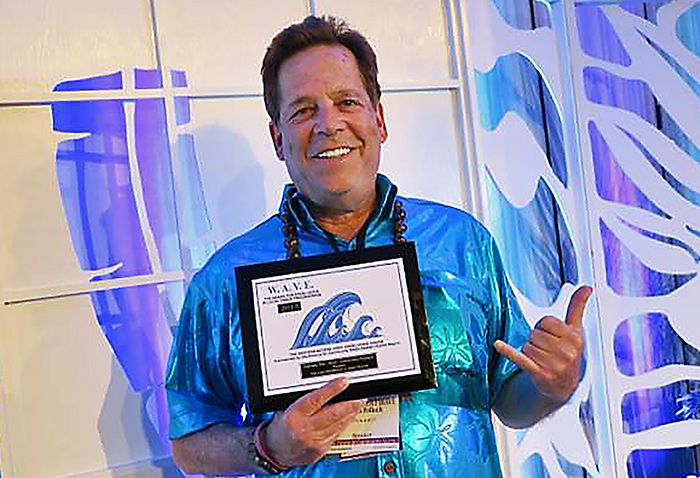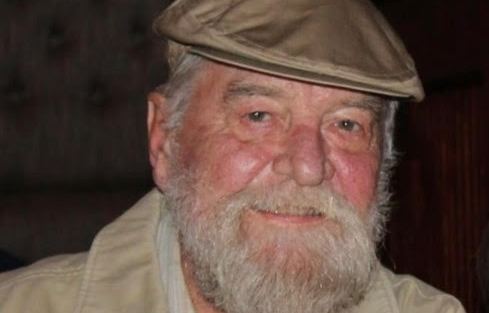Donald Pollock: Professor, filmmaker, photographer, husband

Donald Pollock: Professor, filmmaker, photographer, husband, father, world traveler, and farmer
Donald Pollock, a University of La Verne professor and longtime Claremont resident, died of cancer at his home on March 24. He was 71. During his 28-year career at the university, Pollock progressed through the ranks of assistant, associate, and full professor, before being named Professor Emeritus upon his retirement. Pollock served as head of the broadcast program for much of his time at La Verne.
Pollock taught students that film could be used to do good in the world, and for many years had his advanced students produce a video magazine about interesting people, places, and events in and around La Verne. The program, “Spotlight,” won multiple awards.
Pollock entered students’ films into many competitions, and the art and communications building at the university is filled with certificates, plaques, and trophies students and faculty won for their work. During his career, Pollock wrote, produced, or directed more than 300 films in a wide variety of genres: promotional, documentary, experimental, sports, graduations, plays, concerts, and lectures. Students Pollock taught have gone on to win more than a dozen Emmy awards.
Teaming with his fellow La Verne professors, Mike Laponis and Shane Rodrigues, Pollock’s Adelita Productions won awards from the American Film Institute, the Alliance for Community Media, the Broadcast Education Association, and other organizations. Pollock also won six Telly awards and a Cable Ace award. Under Pollock’s direction, University of La Verne was awarded contracts to run the PEG Access TV stations for La Verne and later San Dimas. In addition to his academic duties, Pollock served as station manager of LVTV for over 20 years.
Donald Pollock was born December 18, 1953, in New York City. He grew up in Westbury, on Long Island, before attending the State University of New York at Binghamton, where he earned a bachelor’s degree in anthropology in 1975. During a one semester sojourn at Duke University, Pollock took a class “cultures of the Pacific,” which led to a lifelong interest in the South Pacific.
Inspired by his father’s social activism and the Jewish call for Tikkun Olam (“Repair the World”), Pollock tutored students from low-income families in New York and subsequently in Los Angeles and in Oregon, where he spent his days working at a day care center with the children of Mexican migrant workers.
Soon after college graduation, Pollock moved briefly to San Francisco, painting houses with his brother and working retail, exploring California and eventually left for Honolulu, where he took art and social work classes at the University of Hawaii, Manoa. He served there as a graduate assistant, earning his MSW in 1978.
Eager to pursue his fascination with the South Pacific, Pollock ventured to American Samoa, where he taught English, government, and world history. When the school year ended, Pollock traveled to Western Samoa, Tonga and Fiji.
On returning to Hawaii, he worked with chronic schizophrenic patients at the Hawaii State Mental Hospital. Pollock quickly realized that talk therapy did not work with this population, and he tried yoga and art therapy. He was then struck by the idea that he could use film as an alternative therapeutic technique, and he soon realized he was more interested in filmmaking than social work.
In 1983, after more than seven years in Hawaii, Pollock moved to Los Angeles to study film at the University of Southern California, where he earned an MFA in film production in 1987. After graduation, Pollock headed on a three-month trip to Tahiti, Australia, New Zealand, and Hawaii with his girlfriend, Frances Gonzales. The two decided that if they could endure three months together in a pup tent, they could probably survive marriage. They tied the knot at the courthouse in Los Angeles in February 1988.
Pollock had a passion for travel and its importance in expanding one’s world view. A self-described restless soul, Pollock visited more than 30 countries on five continents, beginning with a summer in Peru at age 15. Pollock and fellow La Verne professor George Keeler co-led student excursions to the Amazon (twice), Costa Rica, Cuba (twice), and Hawaii. Pollock also had four sabbaticals, where he taught and conducted research in England, Australia, Fiji, and Malta. Bringing his wife and children along on the first two, along with family trips to Thailand, Israel and the United Kingdom, gave the children unique exposure to world cultures.
On moving to Claremont, he became an active involved member of Temple Beth Israel in Pomona, where he was co-president of the Temple brotherhood. He assisted the rabbi and cantor with filming and streaming many services and other events for homebound congregants and other members, especially during and following the pandemic.
He planted some two dozen fruit trees in his yard in Claremont and many more in the yard of a second home in Hilo, Hawaii. While in Hilo over the past three years he became a master gardener and filmed promotional and educational materials for that program while also teaching children about tropical fruit gardening at summer camps. He also published a book of photographs of churches of the Big Island. Pollock selflessly cared for his mother, Bernice, who lived for several years in Claremont Manor, and died there at age 101.
Donald Pollock is survived by his wife, Frances Michelle Gonzales Pollock; daughter Ariella Flora Gonzales Pollock Lustig (Jonah), of Albuquerque, New Mexico; son McKinley Morganfield Gonzales Pollock; and brother Blair Pollock (Rebekkah), of Chapel Hill, North Carolina.
He leaves many friends and relatives throughout the United States and across the planet.







0 Comments